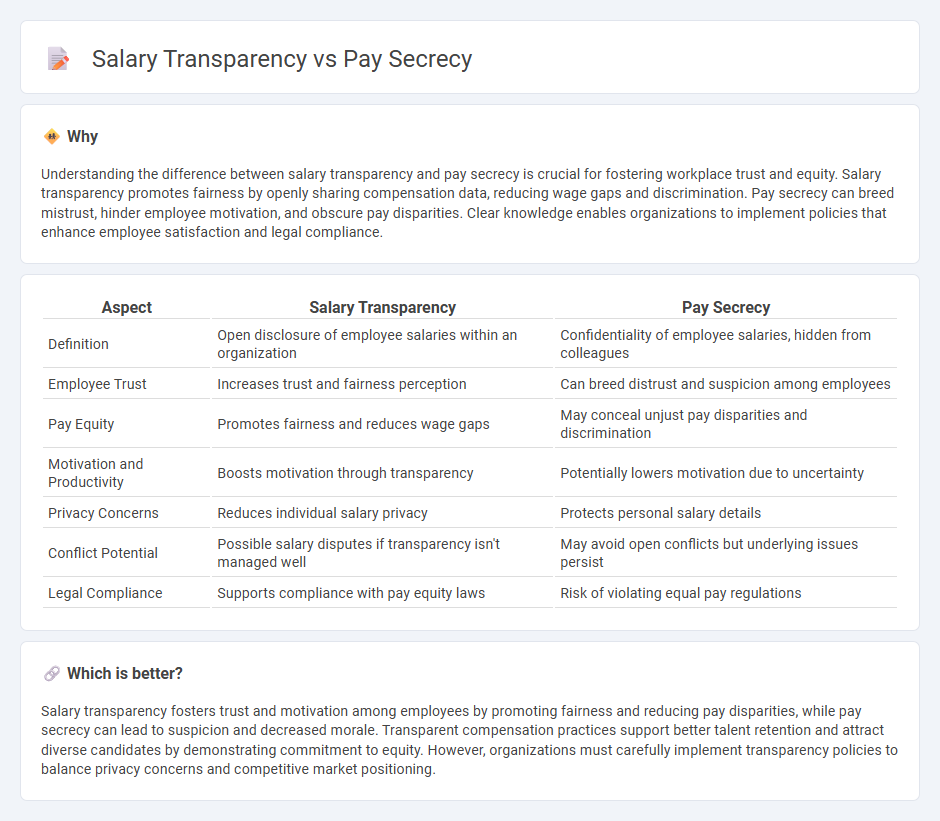
Salary transparency fosters trust, reduces wage gaps, and enhances employee satisfaction by openly sharing compensation information within organizations. Pay secrecy often leads to inequalities, decreased morale, and diminished motivation due to hidden pay structures and lack of clarity. Explore the impact of transparent versus secretive salary practices on workplace culture and employee retention.
Why it is important
Understanding the difference between salary transparency and pay secrecy is crucial for fostering workplace trust and equity. Salary transparency promotes fairness by openly sharing compensation data, reducing wage gaps and discrimination. Pay secrecy can breed mistrust, hinder employee motivation, and obscure pay disparities. Clear knowledge enables organizations to implement policies that enhance employee satisfaction and legal compliance.
Comparison Table
| Aspect | Salary Transparency | Pay Secrecy |
|---|---|---|
| Definition | Open disclosure of employee salaries within an organization | Confidentiality of employee salaries, hidden from colleagues |
| Employee Trust | Increases trust and fairness perception | Can breed distrust and suspicion among employees |
| Pay Equity | Promotes fairness and reduces wage gaps | May conceal unjust pay disparities and discrimination |
| Motivation and Productivity | Boosts motivation through transparency | Potentially lowers motivation due to uncertainty |
| Privacy Concerns | Reduces individual salary privacy | Protects personal salary details |
| Conflict Potential | Possible salary disputes if transparency isn't managed well | May avoid open conflicts but underlying issues persist |
| Legal Compliance | Supports compliance with pay equity laws | Risk of violating equal pay regulations |
Which is better?
Salary transparency fosters trust and motivation among employees by promoting fairness and reducing pay disparities, while pay secrecy can lead to suspicion and decreased morale. Transparent compensation practices support better talent retention and attract diverse candidates by demonstrating commitment to equity. However, organizations must carefully implement transparency policies to balance privacy concerns and competitive market positioning.
Connection
Salary transparency and pay secrecy are directly connected as opposing practices influencing employee trust and organizational culture within Human Resources. Implementing salary transparency promotes fairness, reduces wage gaps, and enhances employee motivation, while pay secrecy often leads to mistrust, potential discrimination, and decreased job satisfaction. Organizations balancing these approaches must weigh legal considerations, cultural norms, and competitive strategies to optimize workforce engagement and retention.
Key Terms
Equity
Pay secrecy often hinders equity by concealing wage disparities and limiting employees' ability to advocate for fair compensation. Salary transparency fosters an equitable workplace by promoting accountability, reducing pay gaps, and enabling informed discussions about compensation. Explore the benefits of transparent pay structures to enhance fairness within your organization.
Morale
Pay secrecy often leads to decreased employee morale due to perceived unfairness and lack of trust, while salary transparency fosters a culture of openness and equity that boosts motivation and engagement. Studies reveal transparent pay structures correlate with higher job satisfaction and lower turnover rates. Discover how implementing salary transparency can transform workplace morale and productivity.
Compliance
Salary transparency fosters compliance by ensuring equitable pay practices and reducing the risk of wage discrimination under laws such as the Equal Pay Act and the Fair Labor Standards Act. Pay secrecy policies can obscure disparities, potentially leading to violations and legal challenges related to transparency and fairness in compensation. Explore how implementing transparent pay structures can enhance regulatory adherence and promote workplace equity.
Source and External Links
the Buffering Effects of the Perceptions of Pay Secrecy and Cynicism ... - Pay secrecy involves policies that limit disclosure of employee pay details or restrict conversations about pay among employees, ranging from full transparency to complete secrecy with some companies using both nondisclosure and communication bans to enforce secrecy.
Power and Pay Secrecy - Despite laws against it, pay secrecy remains common and durable due to employer power, with many workers subject to informal or illegal rules restricting pay discussions, highlighting challenges in enforcing pay transparency.
What is Pay Secrecy? - Aegis Law Firm - Pay secrecy policies prohibit workers from discussing salaries and are illegal in many places like California; laws such as the NLRA protect employee rights to discuss wages and prohibit employer retaliation for such discussions.
 dowidth.com
dowidth.com